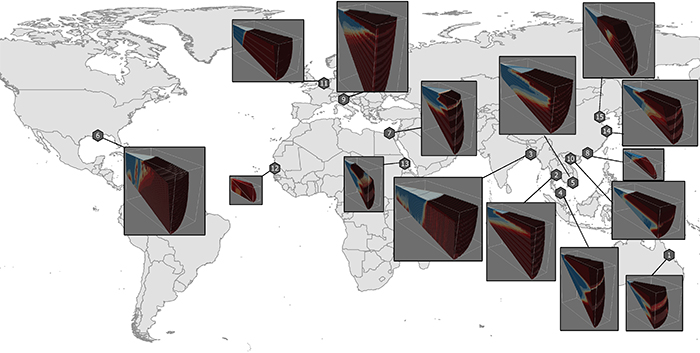Groundwater Salinity In Densely-Populated Deltas: Precious Fresh Groundwater Reserves Risk Exhaustion
Hydrologist Joeri van Engelen assessed the status and drivers of the present-day salinity distribution in groundwater in deltas. These areas are vital to the population and economies of many countries all over the world: they are often densely-populated hubs with intensive agriculture due to fertile soils and have excellent transportation possibilities via ports. Though traditionally depending mainly on surface water to meet freshwater demands, their ever-growing population and intensifying agriculture increasingly rely on groundwater extractions. These extractions will lead to more salt entering the groundwater system, reducing the deltas’ precious fresh groundwater reserves. Despite the increasing importance of these reserves, little is known about the actual size of these fresh groundwater reserves and the factors that control them. Joeri van Engelen’s PhD thesis contributes to a better understanding of the fresh-saline groundwater distribution in these vulnerable areas.
Van Engelen applied computer models of groundwater flow and salt transport, using the national supercomputer in Amsterdam. It was found that the present-day fresh-saline groundwater distribution in deltas was formed over thousands of years, and thus very computationally demanding simulations were required.

Furthermore, he investigated the sustainability of the fresh groundwater reserves in 15 major deltas across the world. With the current amount of groundwater being pumped, the Ganges-Brahmaputra-Meghna (Bangladesh), Nile (Egypt), Pearl River and Yangtze delta (both in China) risk exhaustion of their precious reserves this coming century. With expected increased pumping rates, the Saloum (Senegal), Mekong and the Red River delta (both in Vietnam) can be added to this list. These seven deltas together currently host hundreds of millions of inhabitants, whose lives might be seriously affected by this groundwater exhaustion.
Joeri van Engelen will defend his PhD thesis at Utrecht University, The Netherlands on November 23, 2020.
About Utrecht University
Founded in 1636, Utrecht University is one of the largest research universities of Europe, with over thirty thousand students and a staff of more than six thousand. We invest in creating the leaders of the future through innovative education of the highest quality, as reflected by the University's consistently high position in international rankings. Dedicated to performing groundbreaking research aimed at resolving large global issues, our culture of cooperation is a breeding ground for innovation, new insights and social impact. For more infomation, visit www.uu.nl.
Source: Utrecht University
